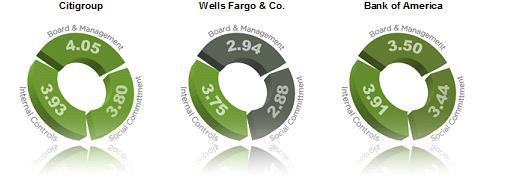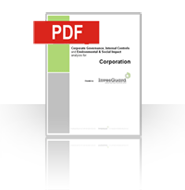April 19th, 2010
Lately, Citigroup appears to be putting its best foot forward. Its CEO provided a very confident (albeit doubtful) front during the recent congressional hearings held by the Oversight Panel for TARP. President and CEO of Citi Mortgage Mr. Sanjiv Das also appeared reasonably confident in Citi’s ability to ‘assist’ underwater homeowners in the recent House Financial Services Committee hearing.
It appears that these Citigroup executives are not too far from the mark…and not just based on their behavior or how confident they were at congressional hearings. Based on recent SEC filings and published information, Citigroup appears to have taken a lead over both Bank of America and Wells Fargo so far as InvesGuard’s non financial scores are concerned.
Look at InvesGuard scores for Citigroup, Bank of America and Wells Fargo below:

A legend of the scores and what they mean has been included at the end of this post.
InvesGuard scores and grades companies based on non-financial information. Different parameters are considered including:
1. Number of transactions between the company and its directors (other than director fees) that may give rise to conflict of interest situations.
2. Directors who also perform consulting services for the company resulting into reduced Director Independence.
3. Level of transparency in Board Audit Committee reports.
4. Relevance of experience of Board members especially those who hold Board level finance, credit and risk committee positions in the financial industry.
5. A look at the quality of a company’s guidelines, charters, principles etc under which it operates.
6. Social and environmental factors such as lending practices, emissions, waste management, recycling etc.
For 2009, Citigroup’s chief area of improvement has been its Board of Directors. Although concerns continue over some aspects, the Citigroup Board is stronger than it used to be. Out of 9 parameters or ‘Core’ comparison events between Bank of America, Citigroup and Wells Fargo, Citigroup has scored the highest or shared the highest score for 7 of these ‘core’ events. These core events include such parameters like CEO and senior management effectiveness, aligned director shareholder interests etc.
Of the three companies, Wells Fargo has by far performed the worst on the Board of Directors and Senior Management front. Its poor scores will get even worse for 2010 with the jump in CEO and senior executive pay without any apparent long term strengthening of shareholder value. Hitting it the hardest, is Wells’ absence of a Board level Asset Quality committee. Even its Board level Finance and Credit committees appear to have some directors with less than relevant experience.
InvesGuard’s Internal Control Environment primarily includes a comprehensive review of a company’s Board Audit Committee including quality of this committee’s reports, its members, their compensation, as well as its charter. Conflict of Interest is also considered within the Internal Control Environment category.
For 2009, all three companies did not explicitly prevent their directors from providing consulting services to each of these companies. Providing consulting services has the potential to take away the independent perspective that directors are expected to provide. It could potentially cloud their judgement. In fact, Citigroup paid consulting fees of $100,000 to Director Joss during 2009 in addition to regular director compensation.
For more detailed information on these scores please visit our store at http://store.invesguard.com/ or send me an email at tejus@invesguard.com
Check back later this week when we will be adding final 2009 JP Morgan Chase and Goldman Sachs scores.
Legend for the scores used in the graphs

please wait...
Rating: 1.1/5 (7 votes cast)
Tags: 2009 InvesGuard Scores, Bank of America, Citigroup, Wells Fargo
Posted in 2009 InvesGuard Scores, Bank of America, Citigroup, Pay regulation, TARP Repayment, Uncategorized, Wells Fargo, company | No Comments »
February 10th, 2010
There has been plenty of talk about bank compensation figures for 2009. Not just talk but a lot of action too…some real, some threatened. A Special Pay Master was appointed to provide compensation oversight over certain entities, threats of pay driven legislation looms on the banking industry.
Over the past two months, starting with the time that Q4 bank earnings were being published, different compensation statistics were sliced and diced:
1. There was the Wall Street J on compensation ratios
2. Not to be outdone, CNN Money published a general running list on compensation
3. And our very own: InvesGuard’s take on compensation
As a sort of a corollary to this already existing exercise on compensation figures, what I thought would be interesting would be to find out how many of those banks that repaid TARP, thereafter jumped to increase compensation, in any form, structure or format to its senior most employees. ..and this what I found
( Warning: I apologize if this is a socialist sounding blog post, but really, if there are companies who repay TARP just to be able to pay more to their employees, then either they did not need TARP funds in the first place and used it only to ‘play’ the market or if they really needed it, then by repaying it are putting their shareholders, and the general economy in peril.)
Now you have to remember that this is sourced from public filings, so only those compensation increases that affected ‘named executive officers’ of a company have been included. In other words, there may be pay increases for employees who are senior enough but are not ‘named executive officers’. Those are not included here.
Findings:
1. We found Bank of America, rushing in January (after repaying TARP in December) to increase the pay of its brand new CEO as well as that of the President of its Consumer Small business and credit card banking division and the salary of its President of Home Loans. And this after determining salaries for these very same individuals in December 2009 based on the approval granted by the Office of the Special Master for TARP Executive Compensation.
2. American Express also increased base salaries of its CEO, Vice Chairman and Group President and CFO in January 2010. According to the SEC filing, the company’s Compensation committee approved a shift in compensation mix by increasing base salary, while reducing the aggregate compensation that generally could be earned through annual incentive awards and the Company’s cash-based portfolio grant program.
3. Over at Morgan Stanley, in January 2010, newly elected Chief Financial Officer, Ruth Porat, was awarded a salary of $750,000, a far cry from the $322,903 paid to the previous CFO Colm Kelheller for 2008. Of course, his cash bonus for 2008 ($2.9 million) more than made up for any salary deficiency.
4. In October 2009, State Street approved retention awards in the form of restricted stock and deferred stock to selected executive officers.
I have to add here, that there are some companies whose top executive officers continue to earn either zero or $1 salary or have given up some part of compensation even after repaying TARP and being under no obligation to do so.
1. Capital One announced in January 2010 that its CEO Mr. Fairbanks will continue to earn zero salary or bonus .
2. At Sterling Bancshares (SBIB), CEO Mr Bridgewater waived his right to receive any restricted stock units which were scheduled to vest in December 2009. According to the company’s filings, “Mr. Bridgwater voluntarily and unilaterally decided to execute this Irrevocable Waiver due to the unprecedented operating environment for the Company and financial institutions across the country, as well as due to the Company’s operating results for the third quarter of 2009.”
3. At Morgan Stanley, chairman and ex CEO John Mack gave up his year end bonus (were they actually giving him one?). New CEO has also “recommended” that he be paid no bonus for 2009.
4. At Old National Bancorp, CEO Mr. Jones and the board “mutually agreed” to pass on any bonus for 2009.
We are still pouring over data and there may be a second part to this post. Keep checking back.
please wait...
Rating: 3.0/5 (5 votes cast)
Tags: Bank of America, bankers pay, capital one, morgan stanley, state street
Posted in Bank of America, TARP Repayment, company | No Comments »







